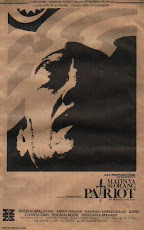#322. LayarEdu : Teaching Screenwriting
It a few hours I walk into my first university screenwriting class for the fall term. Undergraduate and graduate students will fill the room, all eager to learn the screenwriting craft. What do I tell them during the next ten weeks?
Can creative writing even be taught? It's a fair question. William Faulkner, one of the few Americans to win the Nobel Prize for Literature, said writing could not be taught -- but it could be learned.Yet I believe screenwriting differs from all other forms of writing in such a way that it is, in fact, more "teachable" than other creative writing forms. This is why I enjoy teaching it so much.
Screenwriting can be taught because so much of screenwriting craft is "left brained." Format, for example, while abundantly confusing to the newcomer because there are so many contradictory models in the marketplace, is really quite simple once you understand and accept the special function of the spec script, which is what all beginners write. There are a few direct rules to follow, and you follow them. For unusual situations, you use common sense. Far too much worry and energy are spent on format issues by beginners who are understandably confused by all the seemingly conflicting models out there. But most are shooting scripts, which do things differently, or are scripts written by pros who learned format before it became as compressed as it is today and who stick by what they learned (and can because, after all, they are paid first and read second, hence are an investment).
But format, once understood, is simple -- and relatively unimportant (or only important when you do it wrong, usually by trying to do too much). Much more important is screenplay rhetoric, the language with which screenplays are written. Screenwriting is simple writing -- and this is the reason it can be taught. Virtually all beginners overwrite because they come to screenwriting as if it were fiction writing or playwriting or some other narrative form. It isn't. It can be argued that screenwriting isn't even writing in the way we usually use the term. This is why very good writers get so frustrated by screenwriting: all their literary skills not only are irrelevant but get in the way and make for bad screenwriting. Screenwriting is the only form of writing about which you can say, Don't let your writing get in the way of the story.
This is not to say screenplay rhetoric isn't important. It is. But this rhetoric is a minimalist rhetoric, having in common almost nothing with all other forms of writing except hard journalism and poetry. It is minimalist rhetoric.
Story, not writing, is what is most important in a screenplay. Don't let your writing get in the way of your story. Effective storytelling depends on dramatic structure: and the beginning, middle, end template of storytelling that rules western culture also is something that can be taught. You can teach a student how to build a stronger dramatic structure for the story s/he wants to tell. In fact, in a brainstorming, classroom setting, this can be an energetic and exciting exercise. Screenwriting lends itself to collaboration more than any other form of writing and is a natural for the classroom.
But not everything about screenwriting can be taught -- including what may be the most important thing from a commercial perspective, story concept. Producers buy stories, not writing. A screenplay is a blueprint for a movie (not a literary document) and is not read for pleasure, like a novel, so much as for practical reasons -- is this the script we are looking for as the basis of a movie we are willing to spend millions of dollars to make? The story is king.
No one has ever figured out how to teach students to create dynamite story concepts. Oh, sure, you can look at successful film stories and make generalizations about them. This is Monday morning quarterbacking. Coming up with story concepts that start bidding wars, that are seen as instant "necessary movies," is quite another matter. So while I can teach students how to structure their stories in a more powerful way and how to write the scripts with economy so the writing doesn't camouflage the story, I can't teach anyone how to come up with a great idea. If I could, I'd be a millionaire.
All the same, I can teach more concrete and valuable things to students in screenwriting than in playwriting or fiction classes, which I've also taught. This is why I enjoy teaching screenwriting most -- why, in fact, I haven't yet retired. Teaching screenwriting is fun, in part because the form is collaborative and lends itself to brainstorming, in part because I can see visible progress in every student's work because almost without exception students enter my class with normal writing habits, which through the screenwriting lens becomes overwriting.
There's actually something I can teach. This is why I'll be excited to walk into class today.`by Charles Deemer
____________________________________________________________________________________
Charles Deemer teaches graduate and undergraduate screenwriting at Portland State University. He is the author of the electronic screenwriting tutorial, Screenwright: the craft of screenwriting. His book Seven Plays was a finalist for the Oregon Book Award. He was the author of Practical Screenwriting [2005].


















0 ulasan:
Catat Ulasan